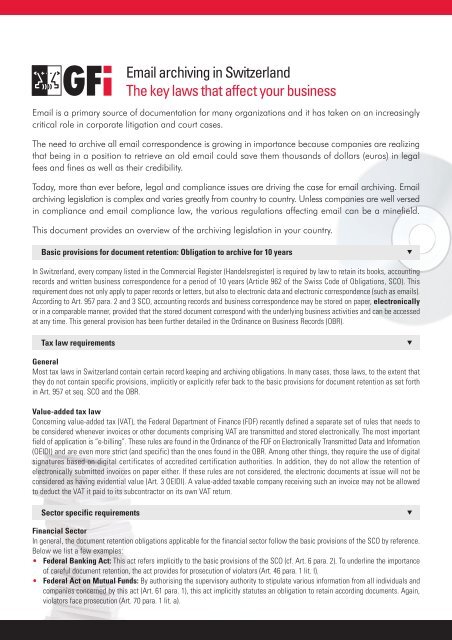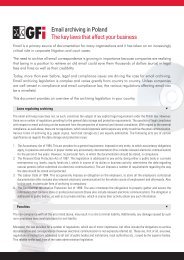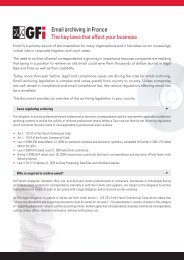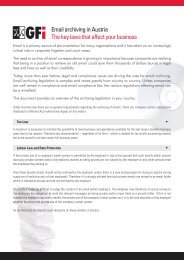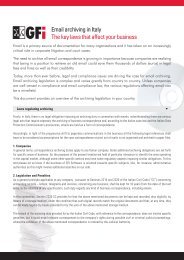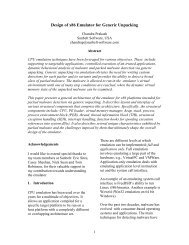Email archiving in Switzerland The key laws that affect ... - GFI.com
Email archiving in Switzerland The key laws that affect ... - GFI.com
Email archiving in Switzerland The key laws that affect ... - GFI.com
Create successful ePaper yourself
Turn your PDF publications into a flip-book with our unique Google optimized e-Paper software.
<strong>Email</strong> <strong>archiv<strong>in</strong>g</strong> <strong>in</strong> <strong>Switzerland</strong><br />
<strong>The</strong> <strong>key</strong> <strong>laws</strong> <strong>that</strong> <strong>affect</strong> your bus<strong>in</strong>ess<br />
<strong>Email</strong> is a primary source of documentation for many organizations and it has taken on an <strong>in</strong>creas<strong>in</strong>gly<br />
critical role <strong>in</strong> corporate litigation and court cases.<br />
<strong>The</strong> need to archive all email correspondence is grow<strong>in</strong>g <strong>in</strong> importance because <strong>com</strong>panies are realiz<strong>in</strong>g<br />
<strong>that</strong> be<strong>in</strong>g <strong>in</strong> a position to retrieve an old email could save them thousands of dollars (euros) <strong>in</strong> legal<br />
fees and f<strong>in</strong>es as well as their credibility.<br />
Today, more than ever before, legal and <strong>com</strong>pliance issues are driv<strong>in</strong>g the case for email <strong>archiv<strong>in</strong>g</strong>. <strong>Email</strong><br />
<strong>archiv<strong>in</strong>g</strong> legislation is <strong>com</strong>plex and varies greatly from country to country. Unless <strong>com</strong>panies are well versed<br />
<strong>in</strong> <strong>com</strong>pliance and email <strong>com</strong>pliance law, the various regulations <strong>affect</strong><strong>in</strong>g email can be a m<strong>in</strong>efield.<br />
This document provides an overview of the <strong>archiv<strong>in</strong>g</strong> legislation <strong>in</strong> your country.<br />
Basic provisions for document retention: Obligation to archive for 10 years<br />
In <strong>Switzerland</strong>, every <strong>com</strong>pany listed <strong>in</strong> the Commercial Register (Handelsregister) is required by law to reta<strong>in</strong> its books, account<strong>in</strong>g<br />
records and written bus<strong>in</strong>ess correspondence for a period of 10 years (Article 962 of the Swiss Code of Obligations, SCO). This<br />
requirement does not only apply to paper records or letters, but also to electronic data and electronic correspondence (such as emails).<br />
Accord<strong>in</strong>g to Art. 957 para. 2 and 3 SCO, account<strong>in</strong>g records and bus<strong>in</strong>ess correspondence may be stored on paper, electronically<br />
or <strong>in</strong> a <strong>com</strong>parable manner, provided <strong>that</strong> the stored document correspond with the underly<strong>in</strong>g bus<strong>in</strong>ess activities and can be accessed<br />
at any time. This general provision has been further detailed <strong>in</strong> the Ord<strong>in</strong>ance on Bus<strong>in</strong>ess Records (OBR).<br />
Tax law requirements<br />
General<br />
Most tax <strong>laws</strong> <strong>in</strong> <strong>Switzerland</strong> conta<strong>in</strong> certa<strong>in</strong> record keep<strong>in</strong>g and <strong>archiv<strong>in</strong>g</strong> obligations. In many cases, those <strong>laws</strong>, to the extent <strong>that</strong><br />
they do not conta<strong>in</strong> specific provisions, implicitly or explicitly refer back to the basic provisions for document retention as set forth<br />
<strong>in</strong> Art. 957 et seq. SCO and the OBR.<br />
Value-added tax law<br />
Concern<strong>in</strong>g value-added tax (VAT), the Federal Department of F<strong>in</strong>ance (FDF) recently def<strong>in</strong>ed a separate set of rules <strong>that</strong> needs to<br />
be considered whenever <strong>in</strong>voices or other documents <strong>com</strong>pris<strong>in</strong>g VAT are transmitted and stored electronically. <strong>The</strong> most important<br />
field of application is “e-bill<strong>in</strong>g”. <strong>The</strong>se rules are found <strong>in</strong> the Ord<strong>in</strong>ance of the FDF on Electronically Transmitted Data and Information<br />
(OElDI) and are even more strict (and specific) than the ones found <strong>in</strong> the OBR. Among other th<strong>in</strong>gs, they require the use of digital<br />
signatures based on digital certificates of accredited certification authorities. In addition, they do not allow the retention of<br />
electronically submitted <strong>in</strong>voices on paper either. If these rules are not considered, the electronic documents at issue will not be<br />
considered as hav<strong>in</strong>g evidential value (Art. 3 OElDI). A value-added taxable <strong>com</strong>pany receiv<strong>in</strong>g such an <strong>in</strong>voice may not be allowed<br />
to deduct the VAT it paid to its subcontractor on its own VAT return.<br />
Sector specific requirements<br />
F<strong>in</strong>ancial Sector<br />
In general, the document retention obligations applicable for the f<strong>in</strong>ancial sector follow the basic provisions of the SCO by reference.<br />
Below we list a few examples:<br />
• Federal Bank<strong>in</strong>g Act: This act refers implicitly to the basic provisions of the SCO (cf. Art. 6 para. 2). To underl<strong>in</strong>e the importance<br />
of careful document retention, the act provides for prosecution of violators (Art. 46 para. 1 lit. l).<br />
• Federal Act on Mutual Funds: By authoris<strong>in</strong>g the supervisory authority to stipulate various <strong>in</strong>formation from all <strong>in</strong>dividuals and<br />
<strong>com</strong>panies concerned by this act (Art. 61 para. 1), this act implicitly statutes an obligation to reta<strong>in</strong> accord<strong>in</strong>g documents. Aga<strong>in</strong>,<br />
violators face prosecution (Art. 70 para. 1 lit. a).
• Federal Act on Stock Exchanges and Securities Trad<strong>in</strong>g: This act too, refers to the basic provisions of the SCO (Art. 16 para.<br />
2). For banks, it refers to the Federal Bank<strong>in</strong>g Act (Art. 16 para. 4). However, as l<strong>in</strong>ed out above, the Federal Bank<strong>in</strong>g Act does not<br />
provide for special rules on document retention, but aga<strong>in</strong> refers to the SCO.<br />
• Federal Act on Money Launder<strong>in</strong>g: This act stipulates an obligation for the f<strong>in</strong>ancial <strong>in</strong>termediary to document concluded<br />
transactions as well as the results of the enquiries a f<strong>in</strong>ancial <strong>in</strong>termediary is required to perform under this act (Art. 7 para. 1). He<br />
has to reta<strong>in</strong> these documents for a m<strong>in</strong>imum of ten years after term<strong>in</strong>at<strong>in</strong>g the bus<strong>in</strong>ess relationship or after conclud<strong>in</strong>g the<br />
transaction <strong>in</strong> question (Art. 7 para. 3).<br />
Insurance<br />
• Federal Act on Accident Insurance (FAAI) and Federal Ord<strong>in</strong>ance on Accident Insurance (FOAI): Employers are required<br />
to keep records of various data regard<strong>in</strong>g their employees, e.g. on the salary or the number of days they worked (Art. 93 para. 1<br />
FAAI). All documentation needs to be reta<strong>in</strong>ed for at least five years, start<strong>in</strong>g at the end of a calendar year, dur<strong>in</strong>g which the last<br />
entry was made (Art. 116 para. 3 FOAI).<br />
Tele<strong>com</strong>munications<br />
• Decree concern<strong>in</strong>g Tele<strong>com</strong>munication Services: As long as customers are entitled to contest their <strong>in</strong>voice, they can ask their<br />
operator to produce the data, which has been used by the operator to prepare the <strong>in</strong>voice (Art. 60 para. 2).<br />
• Federal Act on Surveillance of Postal and Tele<strong>com</strong>munication Traffic: In order to allow for an effective crim<strong>in</strong>al prosecution,<br />
dur<strong>in</strong>g six months, operators are required to reta<strong>in</strong> all data on traffic and <strong>in</strong>voic<strong>in</strong>g as well as all data, which the law enforcement<br />
agency may require to identify the customer.<br />
Legal consequences of non-<strong>com</strong>pliance<br />
Non-<strong>com</strong>pliance with above rules can have several consequences. <strong>The</strong> three ma<strong>in</strong> risks are:<br />
• Crim<strong>in</strong>al prosecution: An <strong>in</strong>tentional or negligent violation of the obligation to reta<strong>in</strong> books, account<strong>in</strong>g records and bus<strong>in</strong>ess<br />
correspondence can be punished with a f<strong>in</strong>e or imprisonment up to 3 months (Art. 325 Swiss Penal Code, SPC). Under certa<strong>in</strong><br />
circumstances, the punishment may be more severe <strong>in</strong> case of a bankruptcy (Art. 166 SPC).<br />
• Legal disadvantages: A bus<strong>in</strong>ess may not be able to prove or enforce claims due to lack of sufficient evidence. While normally it is<br />
with<strong>in</strong> the judge's discretion to assess the evidential value of a document, <strong>in</strong> case of an electronic document, such an assessment<br />
will depend, among other th<strong>in</strong>gs, on whether it has been reta<strong>in</strong>ed <strong>in</strong> the way prescribed by the OBR.<br />
• Damages claims: A bus<strong>in</strong>ess may be subject to damages claims should another person <strong>in</strong>cur damage due to the fact <strong>that</strong> a bus<strong>in</strong>ess<br />
has not <strong>com</strong>plied with its obligation to reta<strong>in</strong> certa<strong>in</strong> documents <strong>in</strong> a particular way.<br />
<strong>The</strong> violation of specific document retention requirements (e.g., VAT law) may have specific consequences (e.g., refusal of certa<strong>in</strong> VAT deductions).<br />
Conclusion<br />
As one can see from the above, it is essential <strong>that</strong> each enterprise (and public authority) sets out a <strong>com</strong>prehensive and tailor-made<br />
<strong>archiv<strong>in</strong>g</strong> or data retention strategy, not only at a general level, but also at an <strong>in</strong>dividual record level. If documents shall be reta<strong>in</strong>ed<br />
and archived electronically for maximum efficiency and usability, powerful, rational and especially flexible tools are required.<br />
<strong>GFI</strong> MailArchiver<br />
<strong>GFI</strong> MailArchiver is used by thousands of adm<strong>in</strong>istrators to <strong>com</strong>ply with the various pieces of legislation <strong>that</strong> cover email <strong>archiv<strong>in</strong>g</strong>.<br />
<strong>GFI</strong> MailArchiver provides a secure central storage for all <strong>com</strong>pany email while allow<strong>in</strong>g fast and easy access to old and deleted<br />
email if required.<br />
Us<strong>in</strong>g the audit<strong>in</strong>g functionality, management can access any email <strong>that</strong> is requested for eDiscovery/email <strong>com</strong>pliance purposes and<br />
provide a guarantee <strong>that</strong> these emails have not been tampered with – a major requirement <strong>in</strong> corporate litigation cases.<br />
With <strong>GFI</strong> MailArchiver, <strong>com</strong>panies can also rest assured <strong>that</strong> they can:<br />
• Reduce reliance on cumbersome PST files and manage and reduce mailbox quotas on Microsoft Exchange server<br />
• Access and manage all archived email from anywhere <strong>in</strong> the world us<strong>in</strong>g their web browser<br />
• Retrieve old and deleted emails on demand – with full thread and conversation<br />
• Use advanced email search and ‘Saved Search’ capabilities<br />
More <strong>in</strong>formation about <strong>GFI</strong> MailArchiver can be found at http://www.gfi.<strong>com</strong>/mailarchiver/.


